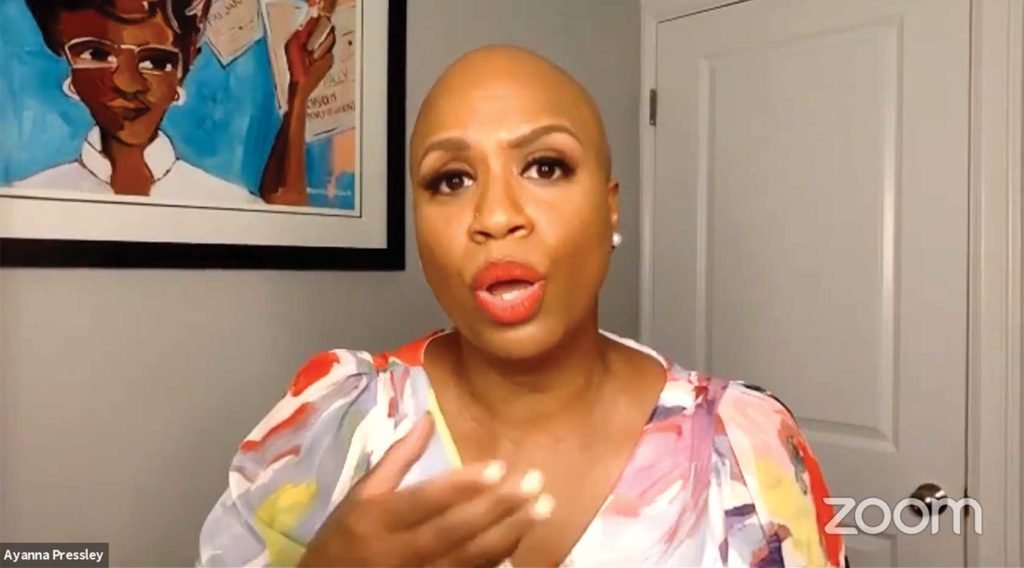Pressley reimagines criminal justice with policy platform
The Congresswoman and activist Andrea James discussed incarceration reforms

U.S. Rep. Ayanna Pressley has reintroduced her People’s Justice Guarantee, mapping out her vision for a more equitable and dignified American justice system.
In a May 27 call with Andrea James, executive director of the National Council for Currently and Formerly Incarcerated Women and Girls, the two discussed how root causes of criminal behavior, especially in young Black boys and girls, are caused by departments meant to protect them.
James has been fighting mass incarceration after her own prison sentence in 2009. As the founder of Families for Justice as Healing, she has advocated for state and federal legislation that reduces mass incarceration and fights for better conditions within prisons.
Pressley said the U.S. government now has an obligation to repair the harm it has caused through its justice system.
“The PJG was crafted in partnership with Andrea James, DA [Rachael] Rollins, lawyers and advocates and community organizers alike, folks that have direct involvement with the system, impacted families,” Pressley said. “We brought everyone together in order to confront these injustices.”
The United States incarcerates a disproportionate amount of its population compared to other countries and spends more on incarcerating immigrants than all other federal enforcement agencies combined. Black and brown people are affected the most, making up 56% of the incarcerated population.
Pressley will be tackling the justice system through the core values of shared power, freedom, equality, safety and dignity.
“The PJG offers a vision of justice and serves as an intersectional guide for my legislative agenda, speaking to a range of issues, from transit equity and housing justice to immigration and decarceration,” Pressley said.
The provisions the congresswoman is calling for include an end to the death penalty; a cap on sentences that do not cause serious harm; trauma-informed mental and physical care in prisons; and designation of a non-911 number for crisis and intervention teams.
James, who grew up in Roxbury, calls the neighborhood the “most incarcerated corridor in the Commonwealth of Massachusetts,” making this issue particularly close to her heart. “My granddaughters live in that corridor right now. It’s the fifth generation in our home in Roxbury, and so this is a part of my life, as it is yours,” she told Pressley.
One issue they are fighting for is a reduction in prison populations by decriminalizing minor infractions, including drug possession and consensual sex work. Pressley regards these as “byproducts of poverty, homelessness, discrimination and/or addiction.” She and James spoke about the effects these hardships have on women and girls.
“A prison will never be a place for a woman or a girl to heal, for anybody, but particularly for a woman or a girl, to heal and advance her life,” James said.
The culture of mandatory minimums on minor crimes keep cycling them into the system, and James said it isn’t changing fast enough, despite recent reforms. She’s doing work helping the community in the meantime.
The two spoke at length about Black girls who are criminalized simply for the way they show up; their hairstyles, personalities and other personal choices incur bias, and later, criminalization.
“I feel like people don’t always believe that it starts that early,” Pressley said.
“To be a Black girl is to be hyper-visible and invisible at the same time. And as a survivor myself, of childhood sexual abuse, within a school environment, so often our girls are neglected,” she continued.
James added that while incarcerated, she found that sexual trauma is a common thread in incarcerated women.
“It just is so painful. Because what we hear mostly, and from our own accounts, and from the accounts of the sisterhood … Is that nobody really believes them,” James said.
Pressley refers to James as a teacher in her life, and one of the motivators for reintroducing this legislative framework. James ended the call by thanking the Congresswoman for listening to the community and letting their concerns inform her policy.
PJG details
Pressley’s vision for helping impacted communities like Roxbury includes limiting the amount of firearms and military equipment for police and civilians and eliminating qualified immunity, a crucial protection from lawsuits that police officers in Massachusetts continuously defend.
Removing the money tied up in incarceration is also crucial to the plan. Pressley wants to prohibit private companies from profiting off incarceration, ban incarceration for debt and end money for bail.






